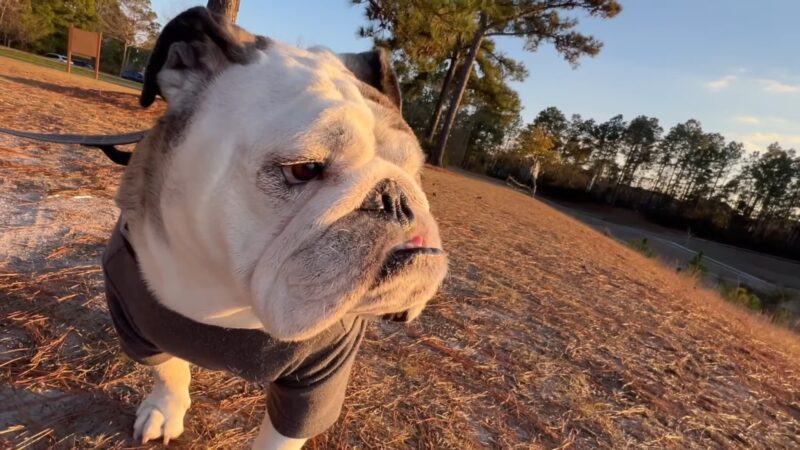The French Bulldog, a breed known for its affectionate nature and distinctive appearance, is also quite sensitive. Owners often notice their pets shaking and wonder about the causes and solutions.
As someone with a lot of experience with different breeds, I will share my expertise about possible reasons for shaking, and how to deal with any of them.
Key Takeaways
French Bulldogs may shake due to various reasons, including reaction to cold weather, stress and anxiety, and even as an expression of joy and excitement.
Health-related causes like distemper, poisoning, low blood sugar, and Addison’s Disease also lead to shaking, requiring careful attention and veterinary care.
Ensuring warmth, creating a stress-free environment, and maintaining regular health check-ups are essential for managing these issues.
1. Reaction to Cold Weather

As an experienced French Bulldog owner, I’ve observed this behavior firsthand and understand the concern it can cause among fellow Frenchie enthusiasts. The best part is that you can feel relaxed if this is the problem.
All you need to do is to bring your dog home.
Keep Your Pet Warm
The effective solution is to invest in good-quality, breed-specific clothing. Dog coats and sweaters aren’t just a fashion statement for your French Bulldog; they’re a necessity for their well-being in cold weather.
These garments provide essential insulation that their short fur can’t, helping to maintain their body heat. When choosing the right clothing, consider materials that offer warmth without causing overheating.
Look for breathable fabrics that allow for easy movement. Remember, Frenchies are active and playful, so their clothing should accommodate their playful nature.
Another tip is to limit their time outdoors when it’s particularly cold. Short, more frequent walks are better than prolonged exposure to chilly weather.
Also, be mindful of the signs of hypothermia, such as excessive shivering, lethargy, or weakness. If you notice any of these symptoms, it’s crucial to warm your Frenchie up immediately and consult your veterinarian if needed.
2. Stress and Anxiety
If you are looking for a pet that will love you unconditionally, look no further than a French Bulldog. These adorable dogs are more than just cute faces; they are faithful friends who will stick with you through thick and thin.
But because they care so much about you, they can also get nervous and worried when you are away from them. Sometimes, they may shake or tremble when they feel anxious.
This is how they show you how much they miss you.
How to Deal With This?
The first step is to create a peaceful and secure environment for your pet. Consistency in their daily routine helps instill a sense of security.
Regular feeding times, walks, and play sessions can reduce anxiety as your little friend knows what to expect. If separation anxiety is the root cause of your dog’s stress, consider gradually acclimatizing them to being alone.
Start with short periods of separation and gradually increase the duration. Another effective strategy is to provide distractions when you’re away.
Puzzle toys filled with treats, or a favorite chew toy, can keep your French Bulldog engaged and help take their mind off your absence.
3. Expression of Joy and Excitement

They love to show their joy and enthusiasm by shaking or trembling. This is how they say hello to you when you come home or when they want to play with you.
But don’t worry, this doesn’t mean they are scared or sick. It just means they are having fun.
As a French Bulldog owner, I know how to tell the difference between happy shaking and nervous shaking. Also, you don’t need to worry about the shaking in this case at all, it’s simply part of their nature.
However, be sure to pay attention and notice the difference if the behavior changes and starts appearing as an issue.
4. Distemper
Distemper is a dangerous virus that can harm French Bulldogs and other dogs. It can cause shaking and other problems, like fever, runny nose, cough, tiredness, or not eating well.
These are signs that your Frenchie needs help right away. It can damage your dog’s lungs, stomach, and nerves.
You should know how to protect your Frenchie from this disease and what to do if you see any symptoms.
Preventive Healthcare
The most effective way to protect your pet from distemper is through proactive and preventive healthcare. This begins with adhering to a regular vaccination schedule.
Vaccinations are the first line of defense against distemper, and it’s essential to ensure that your dog receives these shots as per the schedule advised by your veterinarian. In addition to vaccinations and regular check-ups, maintaining a healthy lifestyle for your Frenchie is important.
A balanced diet, regular exercise, and good hygiene practices play a significant role in strengthening their immune system. In case of any unusual symptoms, including persistent shaking, it’s imperative to consult your veterinarian immediately.
Early detection and treatment can make a significant difference in the outcome of diseases like distemper.
5. Poisoning and Toxins

Their curiosity and tendency to explore can sometimes lead them into dangerous situations, particularly when it involves exposure to harmful substances. The consequences of ingesting or coming into contact with toxins can be severe, often resulting in tremors, seizures, and other critical symptoms.
Ensure a Safe Environment
Creating a safe environment is key to preventing accidental poisoning. This involves a thorough assessment of both indoor and outdoor spaces to which your French Bulldog has access.
Common household items like certain plants, human medications, cleaning products, and some foods (like chocolate, xylitol, and grapes) can be toxic to dogs. Ensuring these items are securely stored and out of your pet’s reach is essential. In the garden or during walks, be cautious about what your dog might pick up or sniff.
Pesticides, fertilizers, and even some mulches can be harmful if ingested. Similarly, be cautious about bodies of water that may be contaminated with algae or chemicals, as these can also pose a risk to your dog’s health.
6. Low Blood Sugar
Hypoglycemia, a condition marked by lower-than-normal blood sugar levels, can be a concerning health issue, especially in smaller dog breeds like the French Bulldog. These dips in blood sugar can lead to symptoms such as shaking, which can be distressing to witness.
Proper Nutrition is Essential
Regular feeding schedules play a vital role in maintaining stable blood sugar levels in French Bulldogs. Since smaller breeds have faster metabolisms and less energy reserves, they can be more susceptible to blood sugar drops, especially if meals are missed or delayed.
Your veterinarian might recommend small, frequent meals throughout the day instead of one or two large meals. Watch for signs of hypoglycemia such as weakness, lethargy, shaking, or seizures.
If you notice any of these symptoms, it’s important to consult your vet immediately.
7. Addison’s Disease
This disorder occurs when the adrenal glands fail to produce enough of certain hormones, such as cortisol and aldosterone. The hormones are crucial for various bodily functions, and their deficiency can lead to symptoms like shaking, lethargy, vomiting, and weight loss.
Medical Intervention and Care
Early and accurate diagnosis is critical when Addison’s Disease is suspected. This condition can be challenging to diagnose, as its symptoms often resemble those of other illnesses.
If you notice signs like shaking, combined with other symptoms such as weakness, lack of appetite, or frequent gastrointestinal issues, it’s important to consult with your veterinarian. The dosage and type of medication will depend on the severity of the condition and your dog’s specific needs.
Additionally, it’s important to be aware of any sudden changes in your dog’s condition, as Addison’s Disease can sometimes lead to an Addisonian crisis, a potentially life-threatening situation that requires immediate veterinary attention.
FAQs

Do French bulldogs shake in their sleep?
French bulldogs may shake in their sleep for various reasons, such as dreaming, being cold, or having a medical condition. Shaking in sleep is usually normal and harmless, but you should consult your vet if your dog is shaking excessively, violently, or along with other symptoms.
Should I be worried if my dog is trembling?
Trembling can be a sign of many things, such as fear, excitement, nausea, or pain. If your dog is trembling occasionally and mildly, it may not be a cause for concern. However, if your dog is trembling constantly, severely, or with other signs of distress, you should see your vet as soon as possible.
Should I be worried if my dog is shaking randomly?
Shaking randomly can also indicate various issues, such as anxiety, poisoning, or neurological problems. Some dogs may shake more than others, especially small or thin-coated breeds. If your dog’s shaking is unusual, sudden, or persistent, you should contact your vet for advice.
How do you know a dog is in pain?
Dogs may show pain in different ways, depending on the cause and severity. Some common signs of pain in dogs are decreased activity, restlessness, vocalization, limping, licking, reduced appetite, or aggression. If you notice any of these signs in your dog, you should seek veterinary attention to find and treat the source of pain.
Summary
As you can see, multiple reasons are causing your little friend to shake. Even though some of them are a reaction, mostly a happy one, it could also be an indication of health issues.
In that matter, the key is to always be focused on your dog’s behavior and notice some potential problems on time. In the end, we have to mention that you should keep up with news about dogs, including safety and nutrition tips.
For example, there might be a type of food you didn’t even know your dog could eat, like Celery.

